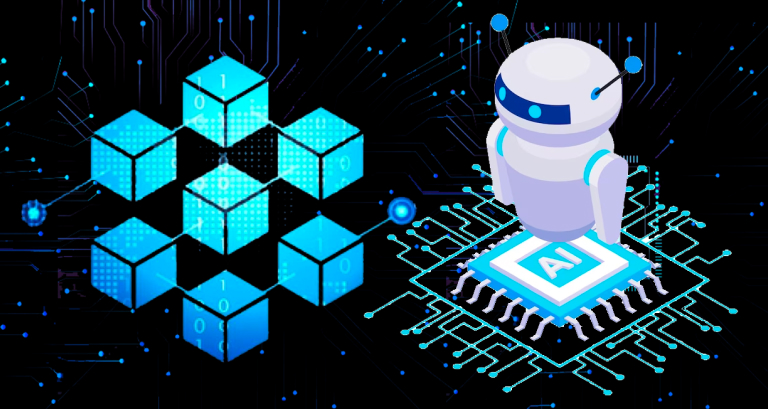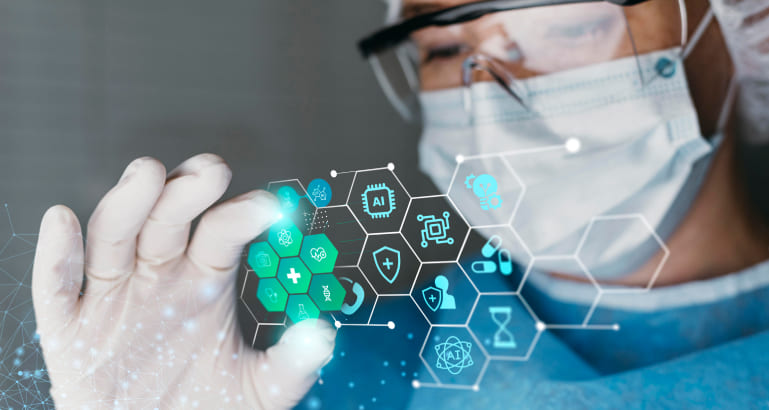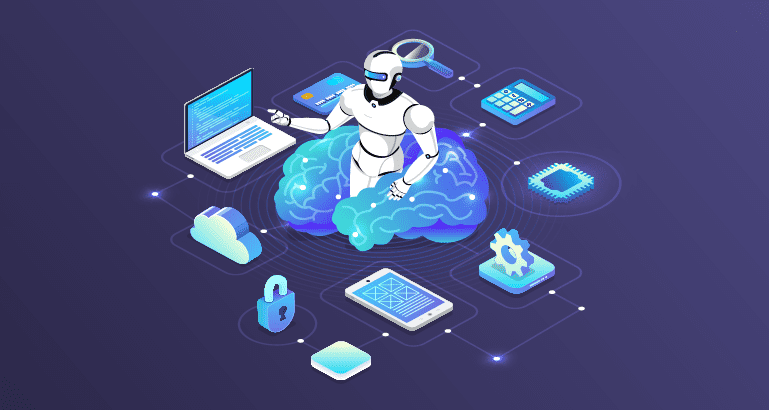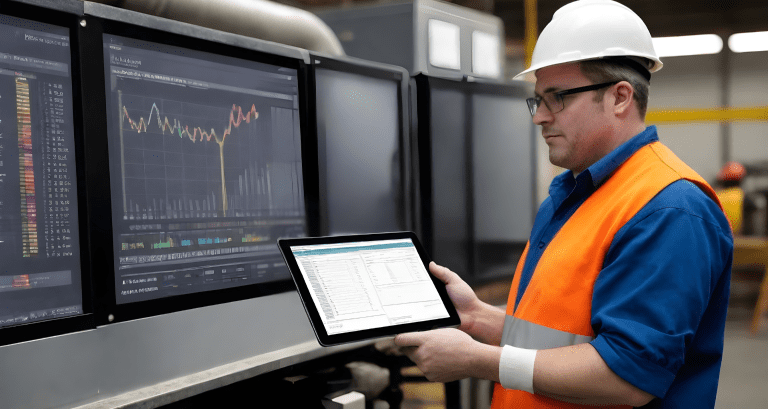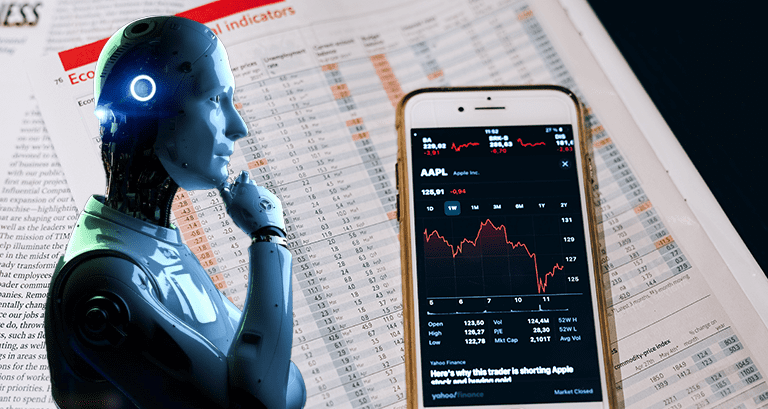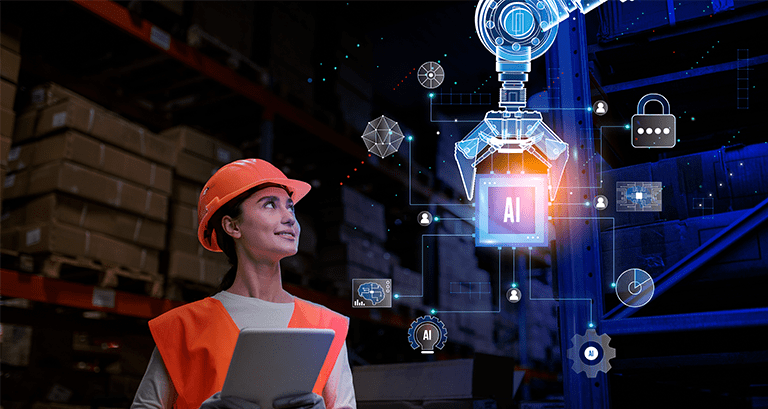The Intersection of AI and Blockchain: Revolutionizing Technology
In the rapidly evolving landscape of technology, two groundbreaking innovations have captured the world's attention: Artificial Intelligence (AI) and Blockchain. Both AI and blockchain have the potential to transform industries and reshape the way we live and work. While distinct technologies in their own right, the convergence of AI and blockchain holds immense promise for creating new possibilities and solving complex problems.
Artificial intelligence
Artificial Intelligence, often referred to as AI, is a branch of computer science that focuses on creating intelligent machines capable of performing tasks that typically require human intelligence. AI systems learn from vast amounts of data, recognize patterns, and make informed decisions or predictions. From natural language processing and computer vision to machine learning and robotics, AI has permeated various aspects of our lives, revolutionizing industries such as healthcare, finance, and transportation.
Blockchain technology
On the other hand, blockchain technology is a decentralized and distributed ledger system that enables secure and transparent transactions without the need for intermediaries. It operates through a network of computers (nodes) that collectively maintain a shared database of records, known as blocks, which are linked together in a chronological chain. Blockchain ensures trust, immutability, and tamper-proof transactions, making it ideal for applications that require transparency, security, and accountability, such as financial transactions, supply chain management, and identity verification.
Let's dive into how AI's capabilities can empower blockchain technology:
- Enhanced Functionality: AI brings advanced analytical and decision-making capabilities to blockchain networks. By integrating AI algorithms, blockchain systems can process and interpret vast amounts of data, enabling more sophisticated and intelligent operations. AI can analyze blockchain transactions, identify patterns, and extract valuable insights that aid in optimizing processes, improving decision-making, and enhancing overall system performance.
- Improved Security: Blockchain technology already offers a high level of security through its decentralized and immutable nature. However, AI can further strengthen the security aspects of blockchain networks. AI algorithms can analyze network activity, detect anomalies, and identify potential security threats in real time. This proactive approach helps in preventing fraud, cyberattacks, and unauthorized access. Moreover, AI can assist in identity verification, ensuring secure and reliable transactions within the blockchain ecosystem.
- Increased Efficiency: Blockchain networks can sometimes face challenges related to scalability and performance. AI algorithms can address these issues by optimizing network resources, predicting transaction patterns, and streamlining processes. With AI-powered automation, blockchain systems can efficiently manage complex tasks, eliminate bottlenecks, and enhance the overall speed and efficiency of transactions. This can be particularly beneficial in scenarios where real-time transactions and rapid processing are crucial.
- Intelligent Contract Execution: Smart contracts, a cornerstone of blockchain technology, can benefit significantly from AI integration. AI algorithms can analyze data from external sources, such as real-time market conditions or IoT devices, and trigger smart contract actions based on predefined conditions. This dynamic and autonomous execution capability enables smart contracts to adapt to changing circumstances, making them more versatile and responsive to real-world events.
- Data Integrity and Privacy: Data integrity and privacy are vital considerations in any blockchain network. AI can assist in ensuring data accuracy and privacy protection by analyzing patterns and identifying potential vulnerabilities or privacy breaches. AI algorithms can also facilitate data anonymization techniques, preserving privacy while allowing data analysis and insights generation within the blockchain ecosystem.
Smart Contracts and AI
Smart contracts, the self-executing contracts on the blockchain, have revolutionized traditional agreements by automating processes and eliminating the need for intermediaries. However, the integration of AI into smart contracts takes their capabilities to the next level, enabling more dynamic and autonomous contract execution.
- Dynamic Execution: By integrating AI algorithms, smart contracts gain the ability to adapt and respond to changing conditions. Traditional smart contracts operate based on predefined conditions and actions, but AI-powered smart contracts can analyze real-time data from various sources and dynamically adjust their behavior. For example, an insurance smart contract can automatically evaluate weather data and trigger a claim payout if it detects a significant weather event like a hurricane. This dynamic execution capability makes smart contracts more flexible, versatile, and adaptable to real-world events.
- Autonomous Decision-making: AI-powered smart contracts can make autonomous decisions based on data analysis and machine learning algorithms. They can assess complex patterns, evaluate risks, and execute actions without human intervention. For instance, in supply chain management, a smart contract integrated with AI can analyze historical data, market trends, and transportation conditions to autonomously select the most cost-effective and efficient logistics provider for a specific delivery. This autonomy streamlines decision-making processes, reduces delays, and enhances operational efficiency.
- Predictive Capabilities: AI algorithms embedded in smart contracts can leverage historical and real-time data to make predictions and optimize outcomes. They can analyze patterns and trends, assess probabilities, and recommend actions for better results. For example, in investment smart contracts, AI can analyze market indicators, historical performance, and risk factors to predict future trends and recommend investment strategies. These predictive capabilities enable smart contracts to make informed decisions, optimize returns, and reduce risks.
- Self-learning and Improvement: AI-powered smart contracts can continuously learn from new data and improve their performance over time. They can adapt to changing market dynamics, incorporate new information, and optimize their decision-making processes. This self-learning capability allows smart contracts to evolve and become more accurate, efficient, and reliable over the long term.
Real-World Use Cases:
- Insurance: AI-powered smart contracts can automatically assess claims based on various data sources, such as IoT devices or weather data, and trigger payouts without human intervention.
- Healthcare: Smart contracts integrated with AI can autonomously analyze patient data, recommend personalized treatments, and streamline medical billing processes.
- Supply Chain Management: AI-powered smart contracts can optimize supply chain operations by dynamically selecting suppliers, predicting demand, and automating inventory management.
- Energy Trading: Smart contracts combined with AI can autonomously negotiate energy trading agreements based on real-time market conditions and optimize energy distribution.
Tokenization and Asset Management
Tokenization, the process of representing real-world assets as digital tokens on the blockchain, has emerged as a transformative application of blockchain technology. When combined with the capabilities of AI, tokenization opens up new avenues for efficient and automated asset management.
- Automated Valuation: AI plays a crucial role in automating the valuation of tokenized assets. Through machine learning algorithms, AI can analyze various data points, such as historical performance, market trends, and comparable assets, to determine the value of an asset. This automated valuation process removes the need for manual appraisal and provides a more objective and data-driven approach.
- Efficient Issuance: AI streamlines the issuance of tokenized assets by automating complex processes. AI algorithms can verify and validate ownership rights, conduct background checks, and ensure compliance with regulatory requirements. This automated issuance process reduces administrative burden, eliminates intermediaries, and enhances the speed and efficiency of asset tokenization.
- Intelligent Asset Management: AI-powered asset management on the blockchain revolutionizes traditional finance and investment practices. With AI algorithms, tokenized assets can be actively managed to optimize returns, mitigate risks, and respond to market conditions. AI can analyze market data, assess investor preferences, and recommend portfolio adjustments to maximize performance.
- Democratization of Investment: AI-enabled tokenization and asset management democratize investment opportunities by providing greater accessibility to a wider range of investors. Fractional ownership of tokenized assets allows individuals to participate in previously exclusive markets, such as high-value real estate or rare collectibles.
- Enhanced Transparency and Security: The combination of AI and blockchain technology brings transparency and security to asset management. AI algorithms can analyze blockchain data, detect anomalies, and identify potential fraud or unauthorized activities. This ensures the integrity and reliability of tokenized assets, mitigating risks associated with traditional systems.
Conclusion
AI and blockchain, when combined, create a powerful synergy that unlocks new possibilities and elevates the potential of both technologies. The inherent strengths of AI and blockchain complement each other, leading to enhanced functionality, improved security, and increased efficiency within blockchain networks. Get in touch with Nu10's team of skilled AI and blockchain experts to revolutionize your business operations. Automate tasks, streamline processes, and unlock new opportunities for efficiency and innovation.
About Author
Mohit Kataria
Mohit, a career entrepreneur with 21+ years of experience, specializes in conceptualizing large scale analytics initiatives and driving them to success. He co-founded Manthan Research & Analytics, later acquired by M3 and rebranded as m360 Research. He excels in building and scaling high performance teams.

